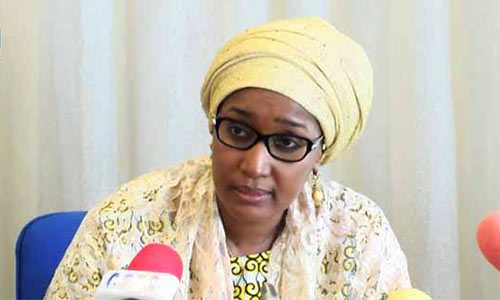THE Federal Government yesterday said that the investigation it carried out in different parts of the country showed that the problem of out-of-school children is not just a northern problem but a national malaise.
The Minister of Human Affairs, Disaster Management and Social Development, Hajia Sadiya Umar Farouk, stated this during the weekly ministerial media briefing organized by the Presidential Communications Team, at the presidential villa, Abuja.
The minister said that the country has over 10 million out-of-school children, who had been thought to be mainly in the North, adding that the malaise cuts across the six geopolitical zones of the country.
According to her, a recent survey carried out in Makoko, Lagos, Enugu and Jos, revealed that the situation is widespread as there are about 7,000 such children in Makoko alone.
Asked if the school feeding programme of the federal government had impacted positively on the country by reducing the number of out-of-school children, she said the feeding programmes had led to increasing in school enrolment.
The position of the Minister was confirmed by the Co-ordinator of the National Social Investment Programme (NSIP) Umar Bindir, who provided the figures, saying there was the need to make people understand that it is a national problem.
He said: “Some people here if you talk about out-of-school children, they think you are talking about almajiri in the North. Some people think it is actually religious or a Muslim thing. But I can tell you in this programme, we have established it as a national issue.
“We sent a team to Lagos. They went to Makoko, they met 7,000 out-of-school children picking things from the dirt. The guy came shaking. We sent another chap to Jos, he came shaking also. We sent another guy to Enugu, and for the first time, everybody realised that out-of-school children is a national problem.”
The Minister described as the elitist assertion that the administration’s N5,000 monthly national conditional cash transfer is insufficient to lift Nigerians out of poverty, adding that the government discovered through direct contact with the beneficiaries that the money has helped the poor and vulnerable of society to escape from their dire situation even as some have been able to save from the amount.
Fielding question on whether N5000 in the midst of the present economic realities in the country, can lift anyone out of poverty, she said, “If you look at the people that you are taking this intervention to, N5,000 means a lot to them because these are poor and vulnerable households and it changes their status, but for you and me, N5,000 is not even enough for us to buy recharge card, that’s the difference.”
Speaking further on the exit programme for N-Power, which has become a source of controversy recently, the minister affirmed that government has a plan of putting about 300,000 applicants on a training programme while the Central Bank of Nigeria (CBN) will provide them loans.
She said: “On the N-Power, thank you for bringing that up and you asked another question if anybody really benefited from the N-programme. We have 500,000 that have been on the programme with Batch A and Batch B being on the programme for four years and two years. Batch A was on the programme for about four years and we were giving them N30,000 stipends monthly. And Batch B benefited for two years.
“So yes, the N-power beneficiaries have benefited because these are people who were not employed who had nothing to do but were engaged and were being paid stipends to use to earn a decent living.
“On the exit programme, yes, we have an exit strategy, which we partner with the Central Bank of Nigeria. And out of this 500,000, about 300,000 indicated interest to be put on an exit programme where you can be trained on different skills, skills of their choice, and they will be given loans by the Central Bank of Nigeria, for them to start their businesses.”







